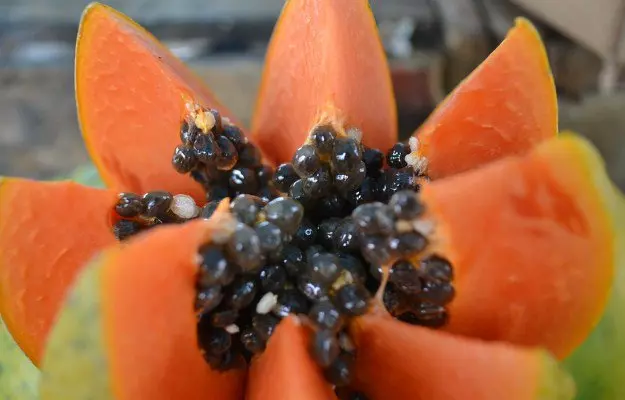Papaya, also known as pawpaw is a dominant fruit in the tropical and subtropical regions of the world. A native of tropical America (first grown in Mexico), this sweet tasting fruit was introduced in India by the Portuguese.
It is believed that almost 40 types of papaya are cultivated throughout the world. They are pear-shaped fruits that can grow up to 20 inches long. Each piece can weigh between 0.49 kg to 1 kg. The ones commonly found in the market are usually about 7 inches long and weigh about 1 kg.
This refreshing and delicious fruit is full of vitamins and minerals. It can be eaten raw, made into a smoothie, salad or even a milkshake. Unripe fruit can be eaten as a vegetable.
Papaya fruit also has a wide variety of health benefits. It contains natural fiber, carotene, vitamin C and other essential minerals that make this fruit beneficial for the skin, gut, and heart. Papaya is also indicated to have anti-inflammatory properties. Additionally, papaya fruit contains an enzyme called papain, which is used in cosmetics, manufacture of chewing gums, pharmaceutical industries, and adhesives.
The best part? papaya can be easily grown in kitchen gardens and backyards. It grows quickly and starts bearing fruits within 8 to 10 months after it is planted and is available throughout the year.
Here are some facts about papaya that you may like to know:
- Botanical name: Carica papaya.
- Family: Caricaceae
- Common name: Papaya is popularly called papaw or pawpaw. It is also sometimes referred to as “tree melon”
- Sanskrit name: Erand karkati
- Parts used: The fruit, leaves, flowers, stems, roots, and seeds can all be used for different purposes.
- Origin: It is native to Mexico and northern South America. But now papaya is grown in almost all tropical areas of the world. In India, papaya is grown in many parts of the country. Major producers of this fruit in the country include Andhra Pradesh, Karnataka, and Kerala in the south, West Bengal, Assam and Orissa in the east Gujarat, Maharashtra and Madhya Pradesh in the west and central India.
- Interesting Facts: India is the largest producer of papaya in the world. It produces about 3 million tonnes of papaya which is half of the world's total papaya production. India also exports papaya to its neighbouring countries such as Bahrain, Saudi Arabia, UAE, Kuwait, Qatar, and the Netherlands.
























